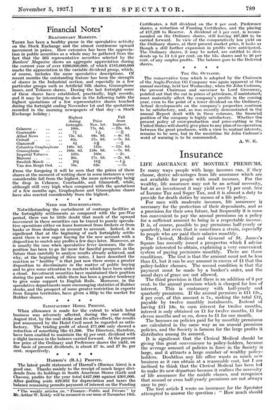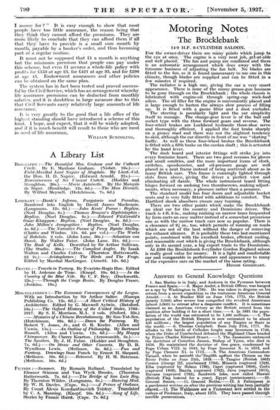Insurance
LIFE ASSURANCE BY MONTHLY PREMIUMS.
IN many ways people with large incomes can, if they choose, derive advantages from life assurance which are not available for people with small incomes. For the wealthy, life assurance may not be an actual necessity, but as an investment it may yield over 7/ per cent free of Income Tax and Super Tax, and it is almost a duty to' provide for death duties by means of a life policy.
For men with moderate incomes, life assurance is necessary for the protection of their dependants, and as a provision for their own future, but frequently it is none too convenient to pay the annual premiums on a policy for a sufficient amount to bring in a respectable income. It is, of course, possible to pay premiums half-yearly or quarterly, but even that is sometimes a strain, especially to people who are paid their salaries monthly.
The Clerical, Medical and General of St. James's Square has recently issued a prospectus which I advise people interested to obtain, explaining a very convenient system of paying premiums monthly. There are three conditions. The first is that the amount must not be less than £1, but it can be any amount in excess of £1 that the policy-holder chooses. The second condition is that the payment must be made by a banker's order, and the usual days of grace are not allowed.
The third provision is that there is an addition of 3 per cent. to the annual premium which is charged for loss of interest. This is customary with half-yearly and quarterly premiums. If the annual premium is £11 13s., 8 per cent. of this amount is 7s., making the total 212, payable by twelve monthly instalments. Instead of having £11 18s. to earn interest for twelve months, interest is only obtained on £1 for twelve months, £1 for eleven months and so on, down to £1 for one month.
The bonuses on policies paid for by monthly premiums are calculated in the same way as on annual premium policies, and the Society is famous for the large profits it distributes among its assured.
It is significant that the Clerical Medical should be giving this great convenience to policy-holders, because the average amount of policies in force in the Society is large, and it attracts a large number of wealthy policy- holders. Doubtless any life office wants as much new business as it can obtain at a reasonable cost, but I am inclined- to think that the Clerical Medical has been led to make its new departure because it realizes the necessity. of life assurance for the middle classes, and recognizes that annual or even half-yearly premiums are not always easy to pay. The first article I wrote on insurance for the Spectator attempted to answer the question ; " How much sholild I assure for ? " It is easy enough to show that most people have too little assurance, the reason being that they think they cannot afford the premiums. They are more likely to conclude that they can afford them if "all that they have to provide is a small sum month l'J'y month; payable by a banker's order, and thus becoming part of a regular routine. .
It must not be supposed that a month is anything but the minimum premium - that - people - can pay under this scheme, but even £1 secures a whole-life policy with profits for £553 at age 25, for £421 at age 35, and for £298 at age 45. Endowment assurances and other policies can be obtained on the same plan.
The system has in fact been tested and proved success- ful by theCivil Service, which has an arrangement whereby, life assurance. premiums can be deducted from monthly salaries, and it is doubtless in large measure due to this that Civil Servants carry relatively large amounts of life assurance: It is very greatly to the good that a life office of the highest standing should have introduced a scheme -of this kind. I hope, and expect, that it will be widely adopted, and if it is much benefit. will result to thoie Who "are most in need of life assurance, WILLIAM -SCHOOLING,



















































 Previous page
Previous page